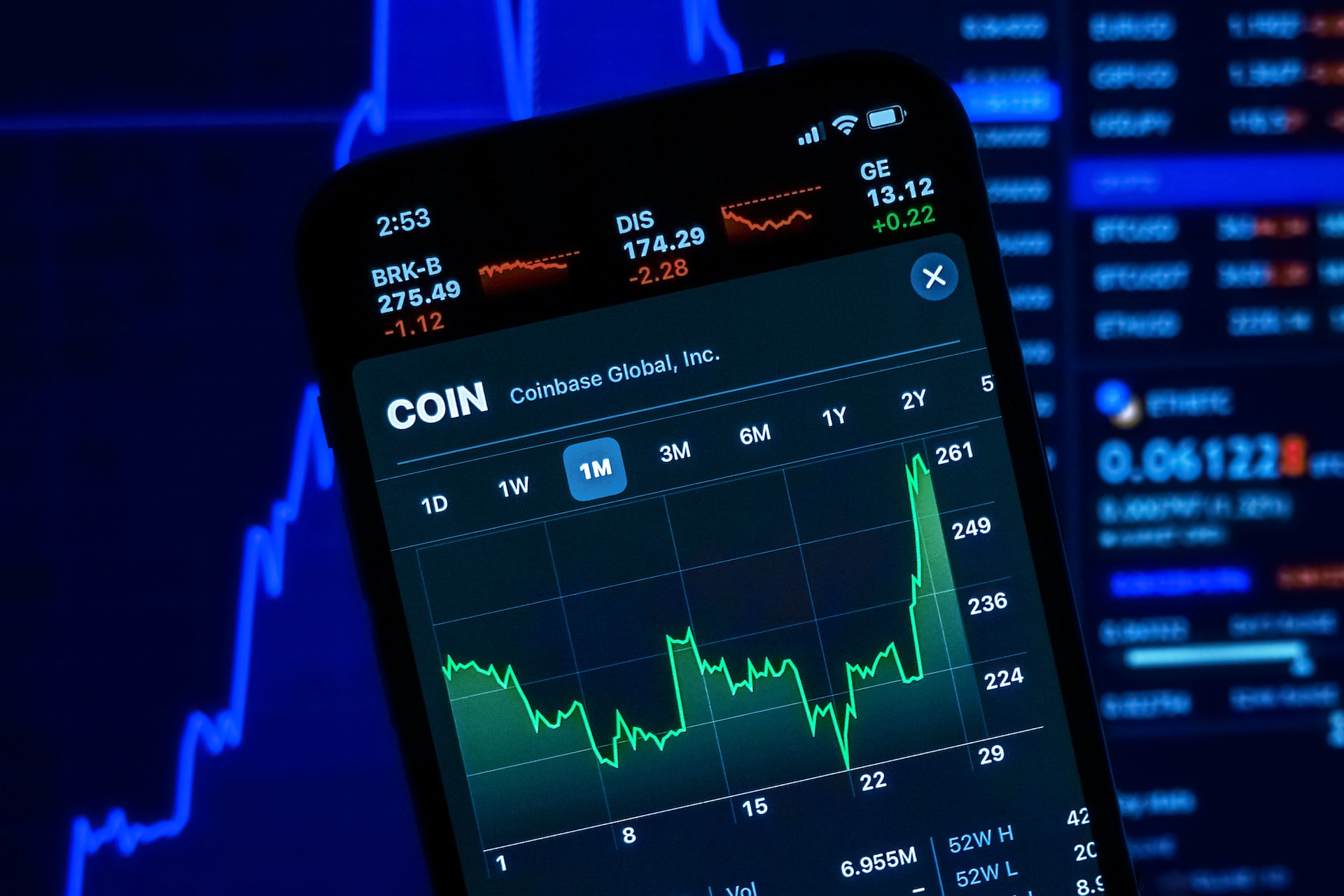Cryptocurrencies aren’t going away anytime soon. These digital currencies use blockchain technology to facilitate decentralized networks, making them substantially different from centralized, traditional currencies. Mind-boggling long-term returns continue to attract crypto investors who don’t want to miss out. Cryptocurrencies are high-risk, high-reward assets with plenty of volatility. Some investors prefer trading these digital assets to avoid overnight drops in their portfolios. We’ll discuss trading crypto so you know if it’s right for you.
Crypto Trading: Overview
Crypto traders buy a virtual currency and hope to flip it for a profit. Investors spread their money across multiple trades instead of taking an all-or-nothing approach with a single cryptocurrency. This method helps investors diversify their trades and mitigate risk. Investors will pay close attention to crypto price action and sell when ready.
Some crypto traders set stop losses and limit prices so they can walk away from their screens. Stop losses force you to sell crypto once it hits a pre-determined price point lower than the current valuation. Traders can adjust the stop loss at any time, but once crypto dips into that territory, the trade automatically takes place. Limit prices force you to sell crypto once it hits a strike price above the current price. Traders use this strategy to realize a satisfactory gain while away from the keyboard.
We’ll walk through an example. Let’s say someone buys an altcoin for $100. This investor could set a stop-loss order at $98 and a limit order at $102. If the cryptocurrency rises to $103, you will have sold it at $102. You can walk away knowing you made a 2% gain on the trade. If the cryptocurrency drops to $99, it doesn’t matter since you sold at $102. The cryptocurrency can rise to $105, but some investors prefer a small gain than risk losing progress.
If the cryptocurrency in our example drops to $95, you would have sold it at $98. You can walk away knowing you only lost 2% on the trade instead of 5%. The cryptocurrency’s market price can return to $100, but you would have already sold your position. It could also continue falling, and you’ll be happy you set a stop loss during those moments.
How Are Cryptocurrencies Traded?
Cryptocurrencies get traded on exchanges. Some exchanges turn fiat currency into crypto, while others let you trade the holdings in your cryptocurrency wallet. Cryptocurrency exchanges that let you use fiat currency will store the crypto for you. You won’t own the crypto directly, but you will still get compensated. It’s similar to an American Depository Receipt for foreign companies. You don’t own shares and can’t vote, but you still benefit from appreciation. You only own your crypto if it’s in your digital wallet, but you don’t have to own it to benefit from appreciation.
Is Crypto Trading Right for You?
Crypto trading is volatile and can take up a lot of time. So, you’ll have to study chart patterns and pay attention to small price fluctuations. Some traders stay on their screens for hours and actively soak in the latest news. Other traders set limits and stop-loss orders to mitigate risk and spend less time looking at Bitcoin price charts.
Crypto trading also gives you peace of mind, knowing a dramatic overnight drop won’t decimate your portfolio. Some investors are afraid of holding onto assets long-term and prefer to get in and out quickly. Crypto trading is high-risk and high reward due to the volatility of assets and the unpredictability of the markets. However, it can be a useful investing approach for people with higher risk tolerances who stay updated on the latest crypto news.
What Are Cryptocurrency Exchanges?
Cryptocurrency exchanges facilitate the buying and selling of orders on various cryptos. This middleman collects fees on each trade and makes the entire process more secure. Cryptocurrency exchanges often hold crypto in their wallets, but some let you trade crypto in your digital wallet. Some retail investors prefer it if the exchanges hold onto their crypto since cold storage and private keys can be a pain. Other crypto investors prefer to own crypto in a digital wallet. In addition, most cryptos have mobile banking apps that help investors trade crypto from anywhere.
How Do Cryptocurrency Exchanges Work?
Cryptocurrency exchanges simplify crypto transactions between investors. Each crypto investor has three primary choices for how they manage their crypto. Cryptocurrency exchanges make these three options possible.
Buying
Some crypto investors prefer a buy-and-hold approach. This is because they believe in the long-term prospects and can wait several years for their crypto assets to grow. Unfortunately, buy-and-hold so far hasn’t performed well in 2022. However, Bitcoin’s past performance has rewarded long-term investors, even those who bought it at its peak in 2017.
Selling
Crypto investors sell their digital assets for many reasons. Some want to diversify into multiple cryptocurrencies or build a cash position to mitigate risk. Other people use tax harvesting to sell at a loss and buy a nearly identical asset to pay fewer taxes. Cryptocurrency exchanges make it easy to exit your positions for any reason.
Trading
Some crypto investors do not want to hold crypto for long periods. They are worried about dramatic price drops and believe riding the wave presents more compelling opportunities. Trading can trigger more capital gains and fees, but it’s better to have high capital gains than a net loss. Trading is a more active investing style than the buy-and-hold approach.
How To Choose a Crypto Exchange for Crypto Trading
Many crypto exchanges have popped up in recent years, but not all of them are the best places for your money. We’ll discuss what to look for in a crypto exchange.
Accessibility
Cryptocurrency trading isn’t as widely adopted as stock trading. Some countries and U.S. states ban certain exchanges. If a cryptocurrency exchange doesn’t operate in your area, you will have to look for another option. Most cryptocurrency exchanges list geographical information on their websites.
Security
Hackers use various tools and techniques to infiltrate systems. Some hackers obtain access to crypto funds and disappear without a trace. The FDIC doesn’t protect crypto holders who lose money from hackers or a crypto exchange filing for bankruptcy. Look for crypto exchanges that use extra safety measures to preserve crypto. Exchanges that use some type of insurance policy to protect crypto will stand out from the other choices.
Coin Availability
Some crypto exchanges only allow you to trade with Bitcoin and Ethereum. These mainstream cryptocurrencies have received the most support, but some traders want to capitalize on emerging altcoins. By the time a crypto exchange responds to user demand and adds a new coin, demand could have already faded.
Crypto traders operating on small-scale crypto exchanges missed out on Dogecoin and Shiba Inu, two cryptos that saw dramatic price swings that turned some people into overnight millionaires. Nearly every crypto exchange platform supports Bitcoin and Ethereum. If you want numerous altcoins, you’ll have to dig deeper for the right exchange.
Fees
Many crypto exchanges charge fees for each transaction. These fees may not scare long-term investors since they rarely make transactions. However, fees can wipe out a trader’s profits. Since traders may make numerous trades in a given week, they get hit with more fees. Day trading enthusiasts get hit with the most fees due to the number of transactions they make. Some crypto exchanges justify higher fees with insurance and a greater range of coins. Traders who are only interested in Bitcoin and Ethereum can search for the lowest fees since they can choose from more exchanges.
Liquidity
Don’t take an asset’s liquidity for granted. Most people buy and sell stocks and crypto without a hitch, but some exchanges make it difficult. Financial institutions with low trading volumes can suffer from poor liquidity, and you may be stuck with an asset longer than desired. Trading altcoins with smaller followings can compound the effects of poor liquidity. On the other hand, established crypto exchanges have stronger liquidity that lets you quickly part ways with your positions when you initiate sell orders.
Other Tools and Features
Crypto exchanges let you buy and sell crypto, but some exceed expectations with their features. For example, some solutions provide financial health insights that reveal how you spend your money. These crypto exchanges educate you on best practices and can make you a better investor. Browse each crypto platform’s tools and features to fully understand what they offer.






